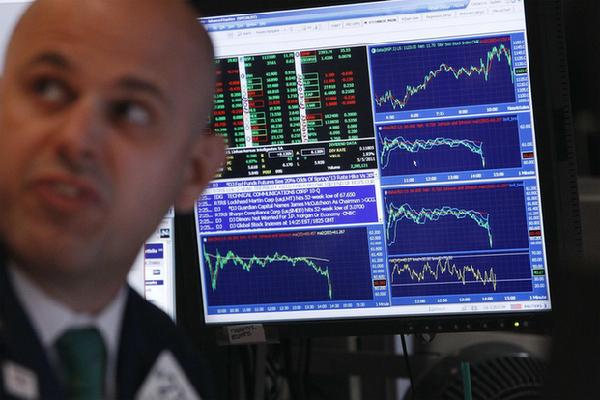US to keep near zero interest rate for 2 years
Updated: 2011-08-10 06:25
(Agencies)
|
|||||||||||
WASHINGTON - The US Federal Reserve on Tuesday took the unprecedented step of promising to keep interest rates near zero for at least two more years, adding it was considering further action, sparking a rebound in stocks.
Investors were still unsure whether the Fed's even stronger promise to maintain rates at rock-bottom lows until mid-2013 would be enough to revive a flagging economic recovery.
Some were also worried about fresh signs of internal discord as three policymakers dissented against the decision, the biggest such rebellion since 1992.
Still, the Fed's actions sparked a rally in equities, which had been under heavy selling pressure, and drove short-term Treasury yields down to all-time lows.
 |
|
A trader works on the floor of the New York Stock Exchange as he listens to an announcement by the Fed in New York August 9, 2011. [Photo/Agencies] |
Stocks had been on a downward spiral starting late last week because of fears about the US economy and Europe's debt crisis compounded by the shock of an historic downgrade of the US credit rating.
Analysts said there was still plenty of unease about the US economy, some of it reflected in the downgraded outlook cited by the US central bank.
Yet some found comfort in the Fed's assurance that it was considering further policy steps, which would most likely include further asset purchases.
"If they have to act they will," said Alberto Bernal, head of emerging markets fixed-income research at Bulltick Capital Markets. "They didn't act today because they didn't want to send a specific message of panic."
Markets will now be looking to Fed Chairman Ben Bernanke's yearly speech at the upcoming Jackson Hole meeting for further clues into any additional policy easing the Fed might consider at its next policy meeting, in September.
There is plenty of uncertainty regarding the Fed's power to stimulate the economy with rates already so low. Japan provides a disheartening example of a country that has kept borrowing costs low for many years without any notable spike in growth.
In its policy statement, the Fed said US economic growth was proving considerably weaker than expected and said inflation will remain contained for the foreseeable future. It added the unemployment rate, currently at 9.1 percent, would come down only gradually.
"The statement was extremely negative in its outlook on the economy," said Omer Esiner, chief market analysts at Commonwealth Foreign Exchange in Washington.
"By pegging the extraordinarily low interest rates to a date in the distant future, the Fed has essentially said that they see the current level of weakness lasting far longer than previously expected.
Dissenting against the decision were Richard Fisher of the Dallas Fed, Narayana Kocherlakota of Minneapolis and Charles Plosser of Philadelphia, who wanted to avoid any specific time reference on the low-rates pledge.
"The committee currently anticipates that economic conditions -- including low rates of resource utilization and a subdued outlook for inflation over the medium run -- are likely to warrant exceptionally low levels for the federal funds rate at least through mid-2013," the Fed said.
It also reiterated its policy of reinvesting the proceeds from bonds maturing in its portfolio, though it did not state a specific timeframe for such actions.
One analyst said the Fed's language left open the possibility of a third round of bond-buying, referred to as quantitative easing.
"They certainly didn't close the door on QE3," said Michael Yoshikami, chief investment strategist at YCM Net Advisors in Walnut Creek, California.
IS IT ENOUGH?
The Fed's decision comes amid financial market turmoil as worries about the global economy escalate after an embarrassing downgrade of U.S. debt. In addition, fears remain that European efforts to put a safety net under heavily indebted Italy and Spain may not suffice to avert wider credit market disruptions.
In an attempt to tamp down market volatility, finance ministers and central bankers of the Group of Seven major world economies held a telephone conference on Sunday and then issued a statement saying they were ready to act to ensure global stability.
Officials had been pinning hopes for an acceleration of U.S. growth in the second half of the year on a healing of supply chain disruptions from Japan's natural disasters, a calming of Europe's debt problems as governments committed to more sustainable fiscal paths and steady gains in business and consumer confidence in the United States.
But those expectations, along with the Fed's forecast for a growth rate of between 2.7 percent and 2.9 percent in 2011, have appeared increasingly over-optimistic in recent weeks.
Related Stories
Obama calls US triple-A nation despite downgrade 2011-08-09 10:37
Obama seeks to reassure faith in US credit 2011-08-09 10:29
Stocks dive amid US woes 2011-08-09 07:43
Time for US to stop blames, take responsibility 2011-08-08 06:52
US loses AAA credit rating from S&P 2011-08-06 10:56
Hot Topics
The European Central Bank (ECB) held a conference call late on Sunday ahead of the market opening, pledging the ECB will step in to buy eurozone bonds with efforts to forestall the euro zone's debt crisis from spreading.
Editor's Picks

|

|

|

|

|

|







